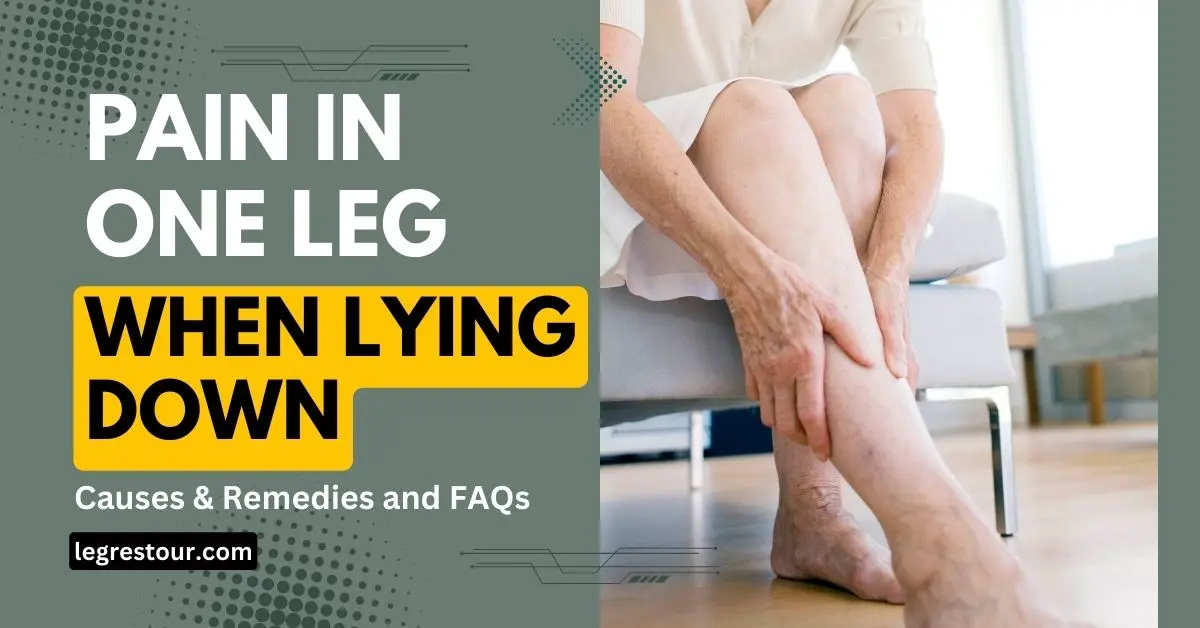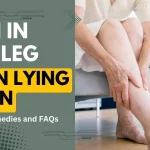Experiencing pain in just one leg when lying down can be alarming. While there are various potential causes, the good news is that there are also many effective remedies to try. This article will explore the common reasons behind unilateral pain in one leg when lying down, provide actionable tips to relieve the discomfort, and answer some frequently asked questions on the topic.
Causes of pain in one leg when lying down
There are a variety of possible explanations for pain isolated to one leg that emerges or worsens when lying down. Here are some of the most common:
Sciatica
Sciatica refers to irritation or compression of the sciatic nerve, which runs down the back of each leg. Sciatic pain often radiates down one leg. Lying down can worsen the pain by putting pressure on the nerve.
Muscle Strains
Muscle strains or pulls in the leg muscles, such as the hamstrings, can cause pain that intensifies at night. Maintaining a single position like lying down can aggravate strained muscles.
Leg Length Discrepancy
Having one leg slightly longer than the other is more common than people realize. Having legs of uneven lengths can tilt the pelvis and put strain on one leg, leading to symptoms like pain when lying down.
Arthritis
Osteoarthritis or inflammatory types of arthritis affecting the knee, hip or lower back joints on one side can flare up when you lie down. Joint stiffness and pain may worsen after staying still.
Peripheral Artery Disease
This circulatory condition causes narrowing of the leg arteries, leading to cramping, achiness or pain when lying or sitting that is relieved somewhat by dangling the legs. It usually impacts just one leg.
Restless Leg Syndrome
RLS causes uncomfortable sensations like tingling, itching or “creepy-crawly” feelings that originate deep in the legs. These symptoms often emerge or worsen at night during periods of inactivity.
Effective Remedies for pain in one leg when lying down
If you experience localized leg pain when reclining, there are some simple yet effective remedies you can try at home for relief:
Apply heat – Heating pads, hot packs, warm baths and showers can relax tense muscles and increase blood flow.
Do gentle stretches – Light stretching that targets the calves, hamstrings and piriformis muscle may alleviate nerve and muscle pain.
Massage the leg – Massaging the sore leg can help relax the muscles, decrease stiffness and increase circulation.
Exercise regularly – Low-impact, moderate exercises like walking, swimming, or yoga helps reduce pain from arthritis, strains, and poor circulation.
Take anti-inflammatories – Over-the-counter NSAIDs like ibuprofen can calm inflammation that contributes to various causes of leg pain.
Use compression – Compression sleeves on the affected leg can reduce swelling and improve circulation.
Elevate the legs – Prop pillows under the calves while lying down to take pressure off the legs and improve blood flow.
Try topical pain-relievers – Creams containing menthol, capsaicin or other analgesics can provide localized pain relief.
Consider ergonomic pillows – Placing pillows between or under the knees while lying on your back can better align the back and relieve nerve compression.
Get sufficient sleep – Being well-rested can help heal strained muscles faster and cope with pain symptoms.
Frequently Asked Questions
Here are answers to some common questions about unilateral leg pain that emerges or worsens when lying down:
What are the most common causes?
The most frequent causes are sciatic nerve pain, muscle strains, joint arthritis, leg length discrepancy, peripheral artery disease, and restless leg syndrome. More serious conditions like a herniated disc, blood clot, or nerve damage can also sometimes be the cause.
Should I see a doctor?
You should consult a physician promptly if the leg pain is severe, persistent, or accompanied by numbness, weakness or swelling in the leg. Seek medical care immediately if the pain starts suddenly or along with shortness of breath or chest pain.
What tests may be needed?
Your doctor may order imaging like x-rays, MRI or CT scans to pinpoint the underlying cause. Bloodwork, nerve conduction studies, ultrasound, or angiograms of the legs may also be warranted in some cases.
Are there ways to prevent this type of pain?
Regular exercise, stretching, massage, weight loss, smoking cessation, and stress management can help protect against various causes of unilateral leg pain. Propping up the legs while lying down and using heating pads can also prevent pain.
What is the best sleeping position if I have this pain?
Sleeping on your back with a pillow under your knees or on your side with a pillow between your knees generally puts the least pressure on the nerves and joints in the legs.
When lying down, unilateral leg pain can stem from a number of causes but doesn’t have to be inevitable. A combination of lifestyle measures, at-home remedies, medical treatment, and optimal sleeping positions can often help manage or resolve this frustrating problem. Being attentive to symptoms and consulting a doctor when appropriate can lead to effective treatment.



